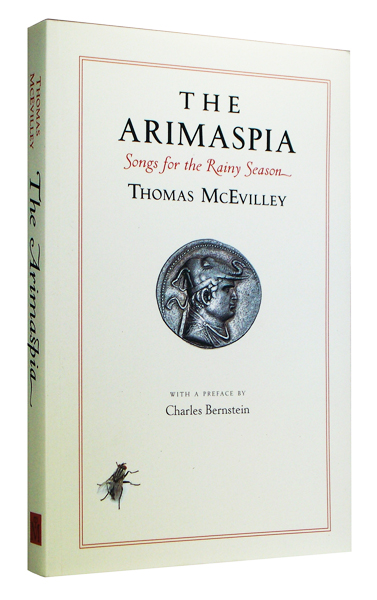- Novels & Novellas
- >
- The Arimaspia
The Arimaspia
Paperback, 312 pages, 5.5 x 8.5", 2014, 978-1-62054-011-4
With a preface by Charles Bernstein (see link below)
Limited edition of 250 copies
"If Ezra Pound and Alexandre Dumas were to become one author and pen a historical novel about Greek philosophy and Indian spirituality in Late Antiquity, the result might be The Arimaspia. Best known for his writing on contemporary art and his novels, the late Thomas McEvilley was also a formidable philologist with a mastery of Greek and Sanskrit, and his neglected masterpiece, The Shape of Ancient Thought, dealt with the mutual influences of these two philosophical worlds. Arimaspia (his last novel) covers the same vast subject — but now as an adventure romance in which the escapades are metaphysical — and sexual. Alexander the Great and Nagarjuna appear, as does an unnamed modern college professor with a roving eye for sex-crazed graduate students — who may be a reincarnation of the unnamed Syrian/Greek narrator who makes the journey (on foot) to the East. Both characters are simultaneously cynics and mystics, all-too-human yet somehow immortal. Frankly I haven't had such a pleasurable reading experience in a dog's age: — like holding The Symposium in one hand and The Count of Monte Cristo in the other."
— Peter Lamborn Wilson
"Classical scholar and contemporary art critic McEvilley brewed this heady infusion of epic poem, erotic novel, and Menippean satire. Published posthumously by nonpareil Kingston literary press McPherson & Company, The Arimaspia is a rara avis in spiraling flight. For thos attened to its high frequency, this prodigious cerebral romp is sheer joy. . ."--Chronogram
The Arimaspia is neither a novel nor a narrative poem, exactly, but a fusion of the two along the lines of the ancient Greek form known as the Menippean Satire. Wikipedia provides the following definition of the form: "The genre of Menippean Satire is a form of satire, usually in prose, which has a length and structure similar to a novel and is characterized by attacking mental attitudes instead of specific individuals. Other features found in Menippean satire are different forms of parody and mythological burlesque, a critique of the myths inherited from traditional culture, a rhapsodic nature, a fragmented narrative, the combination of many different targets, and the rapid moving between styles and points of view."
To read a sample of the text, see link below.
For Peter Valente's essay on The Arimaspia and The Shape of Ancient Thought, go here
-
Larger description
-
Sample Text and Other Links
Issued for the occasion in a special limited commemorative edition limited to only 250 numbered copies and exclusively available directly from this site. The Publication Launch Event: It was SRO on Saturday, June 14th, 6:30 pm at The Golden Notebook in Woodstock, New York, at a launch celebration presented with special guests Peter Lamborn Wilson, George Quasha, Carolee Schneemann, Michael Perkins, and publisher Bruce McPherson. A brief film of Tom reading from the manuscript in 1994 was screened as well.

